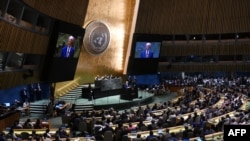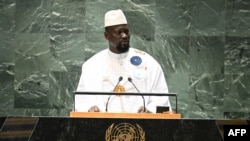As the world grapples with some of the most pressing challenges of the decade, the experts highlighted some significant successes chalked up, while expressing concern over the lack of commitment to tackle the climate crisis.
"Thousands of people in Derna, Libya lost their lives in epic, unprecedented flooding even though as we speak bodies are washing ashore from the same Mediterranean Sea where billionaires sunbathe on their superyachts. Derna is a sad snapshot of the state of our world," U.N. secretary general Antonio Guterres said in his UNGA opening speech.
Fati N’Zi-Hassane, Oxfam International's Africa director, told VOA that the theme of the United Nations General Assembly — "Rebuilding trust and reigniting global solidarity" — highlights the lack of trust among world leaders in meeting the challenges facing the global community today.
"There’s clearly a divide that was discussed, and there’s a need for countries to really come together and agree on some core elements that can help us go forward as a global community," N'Zi-Hassane said.
She said African leaders used the platform to remind the global community about the importance of financing climate action as it is crucial in helping meet the U.N.'s Agenda 2030.
"We are calling for reform of the global financial architecture and a deep review of the quotas, because we want to make sure that the IMF (the International Monetary Fund) is serving the people and not only the most economically powerful," N'Zi-Hassane told VOA.
"We feel that illicit financial flows and the fact that taxes are evading African tax systems is also harming African countries' capacity to mobilize resources domestically. We have estimated that around $200 billion evade the continent through tax arrangements by corporations operating in Africa."
In 2019, developed nations with the most carbon emissions pledged to channel $100 billion annually to less developed countries by the year 2020. That promise was not fulfilled; instead, much of the funding mobilized came in the form of loans.
Alden Meyer, a senior associate at Washington-based climate think tank, E3G, told VOA that the high-level meeting on climate change at UNGA exposed "a vacuum of leadership among the big players," like China, the United States and the United Kingdom. He noted that several developing countries stepped up and made ambitious pledges to tackle the climate crisis.
"We really need to see President (Joe) Biden, President Xi (Jinping), Prime Minister (Narendra Modi) and others step up in the coming months before the Dubai Climate Summit and say what they're prepared to do," Meyer said.
Name & Shame?
Guterres convened a special summit on Wednesday known as the Climate Ambition Summit on the sidelines of UNGA to highlight global leaders with ambitious plans to address the climate change crisis. He did not invite those he said have failed to take the issue seriously, including the world’s biggest polluters — China and the U.S.
Meyer said it would be "very hard" to gauge progress toward meeting the net-zero target — cutting greenhouse gas emission by 45% by 2030 and net zero by 2050 — if global leaders are not "active and committed" to the climate issue.
The world is grappling with a myriad of challenges, including food insecurity in the Horn of Africa, exacerbated by Russia's invasion of Ukraine and climate change, which contributes the very least to the climate crisis. They are occuring amid rising political instability in the Sahel and parts of West and Central Africa.
So, did UNGA achieve anything for a continent now being seen as the center of global geopolitics?
E3G's Meyer thinks leaders "clearly sharpened the focus on the need to scale up clean energy." But he said despite the cost for new technologies like electric vehicles and solar wind storage coming down "dramatically" in recent years, a policy support is needed, particularly in developing countries, to reduce the cost of capital to promote green energy.
"If you're in Africa and you want to invest in solar or wind or some other clean energy project, you’re likely going to pay interest rates of 15, 16 or even 20% as opposed to in the U.S. and Europe, where (interest rates) are in the low to mid-single digits," he said.
"And that just makes many of these projects uneconomic. So, we need to find ways to bring down the cost of financing. We need to address other issues like access to lithium, cobalt, nickel and other critical minerals needed to scale up clean technology."
Meyer, however, said there is a lack of consensus on the need to reduce and eventually phase out the production and use of coal, oil and natural gas as well as fossil fuels, saying the conversation around the topic was "much more contentious."
"We did see that issue put squarely on the table, and it's going to have to be something that the United Arab Emirates Presidency of COP (the United Nations Climate Change Conference) in Dubai figures out how to address."
Political Instability
Recent coups on the continent were also brought to the attention of global leaders at the annual summit. Guinea's junta leader Col. Mamadi Doumbouya defended the power grab by the West Africa's militaries arguing the move in his country was meant to save it from the deposed president’s "broken promises."
Guinea is one of the countries on the continent that has faced a coup since 2020, with Gabon and Niger being the latest — in August and July, respectively. Other leaders like South Africa's Cyril Ramaphosa and Ghana's Nana Akufo-Addo spoke about an "unfair" world where the oppressed have been neglected.
"It is time to acknowledge openly that much of Europe and the United States have been built from the vast wealth harvested from the sweat, tears, blood and horrors of the trans-Atlantic slave trade and the centuries of colonial exploitation," Akufo-Addo said and called for reparations.
Kabir Adamu, an Abuja-based security risk management and intelligence analyst, told VOA that African leaders failed to offer concreate plans for ridding rising political uncertainties in parts of the continent like the Sahel.
"Most of the leaders blamed these neo-colonialist policies for the failing democratic traditions in some of the Sahelien countries," he said but "how well African countries were able to galvanize attention as well as global consensus on this issue was sadly not met."
Some information in this report came from The Associated Press.










Forum